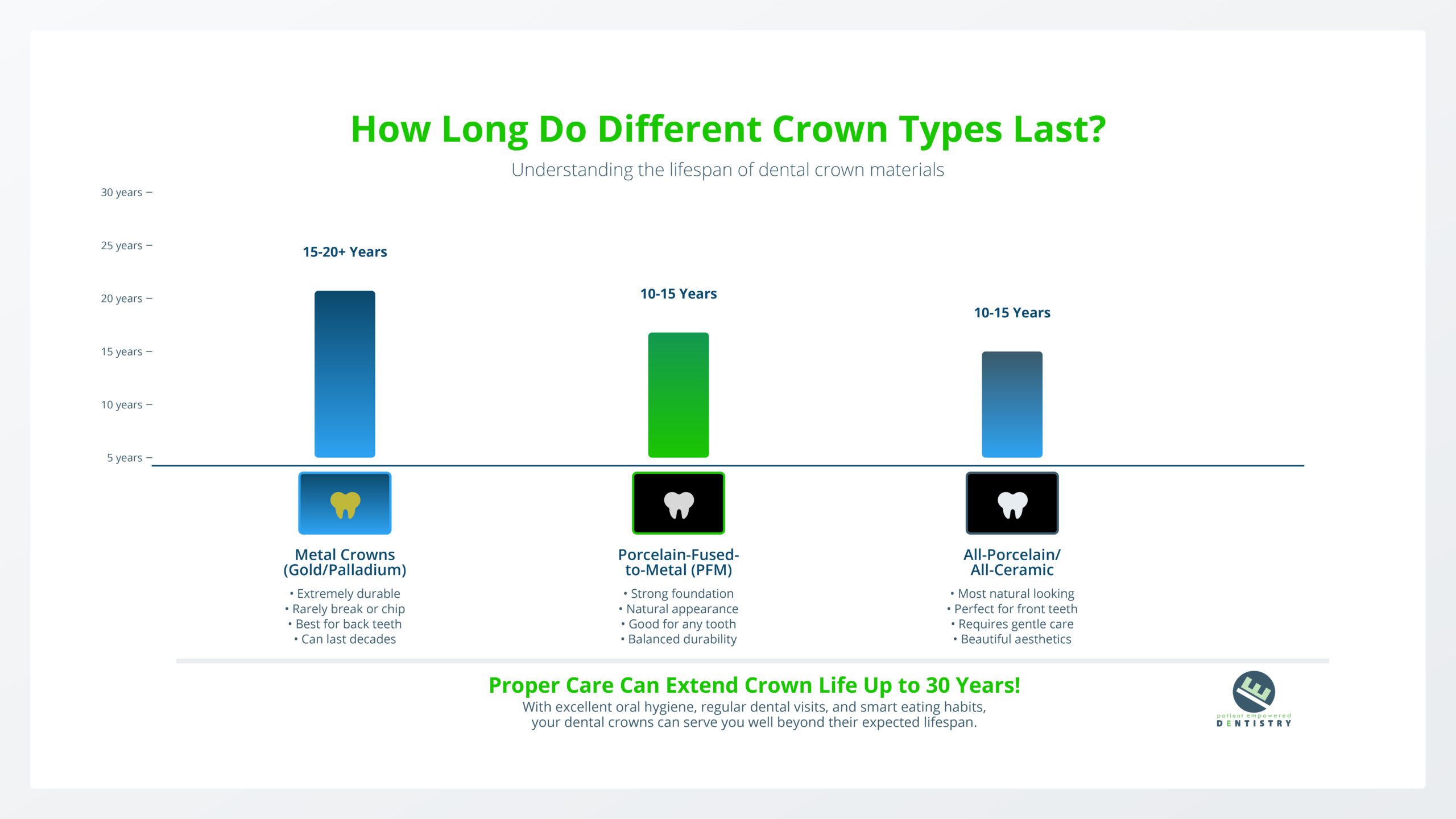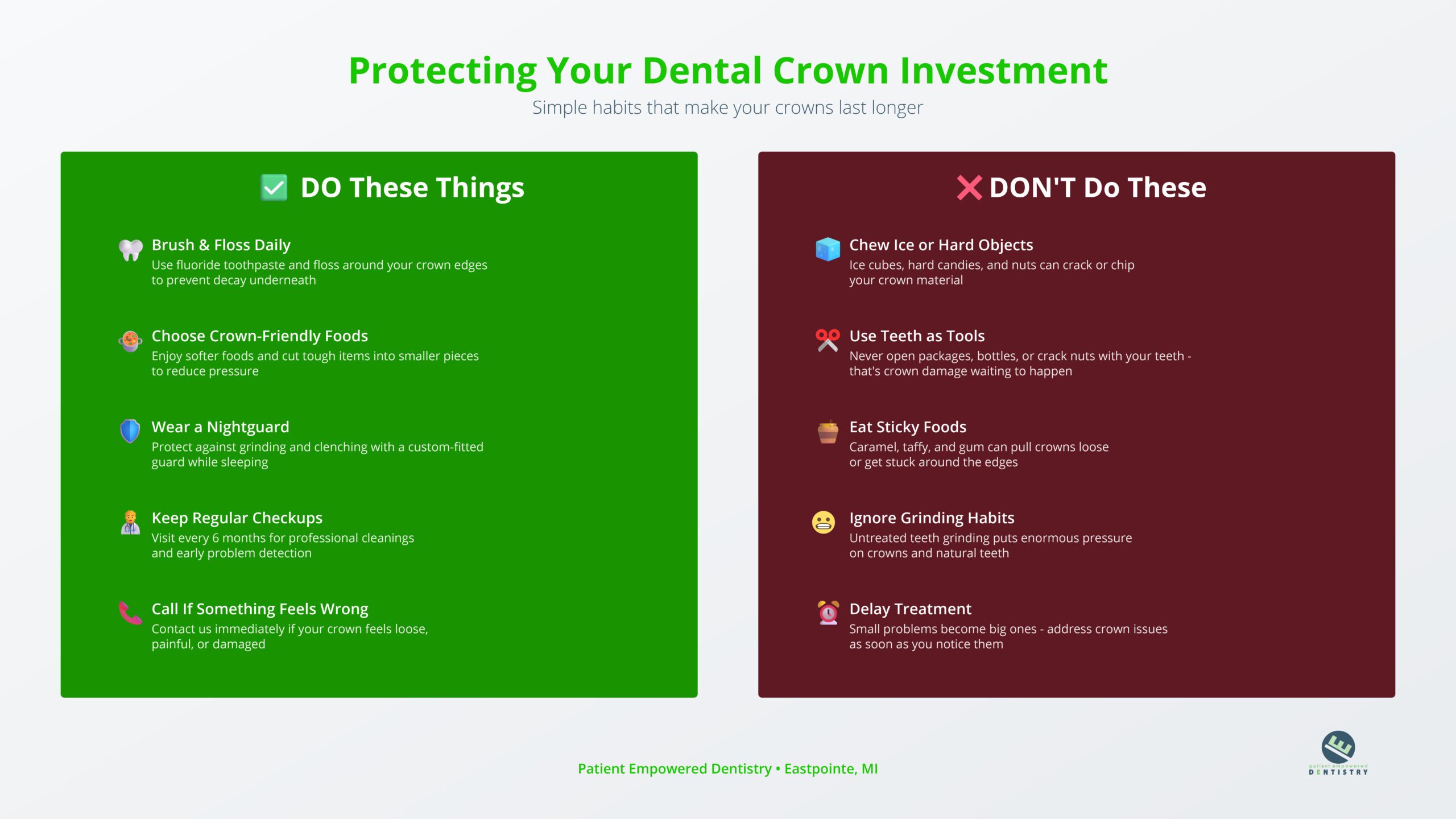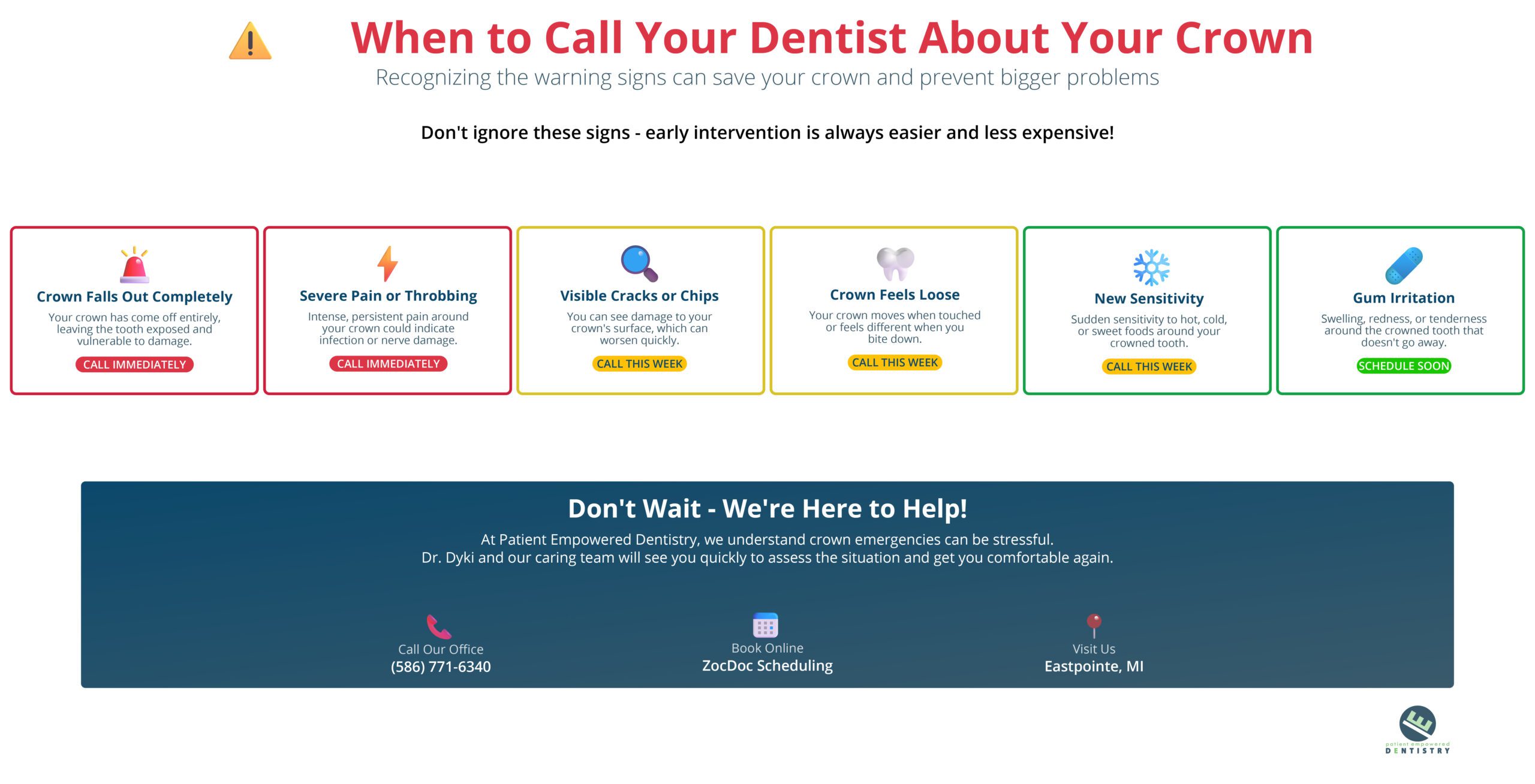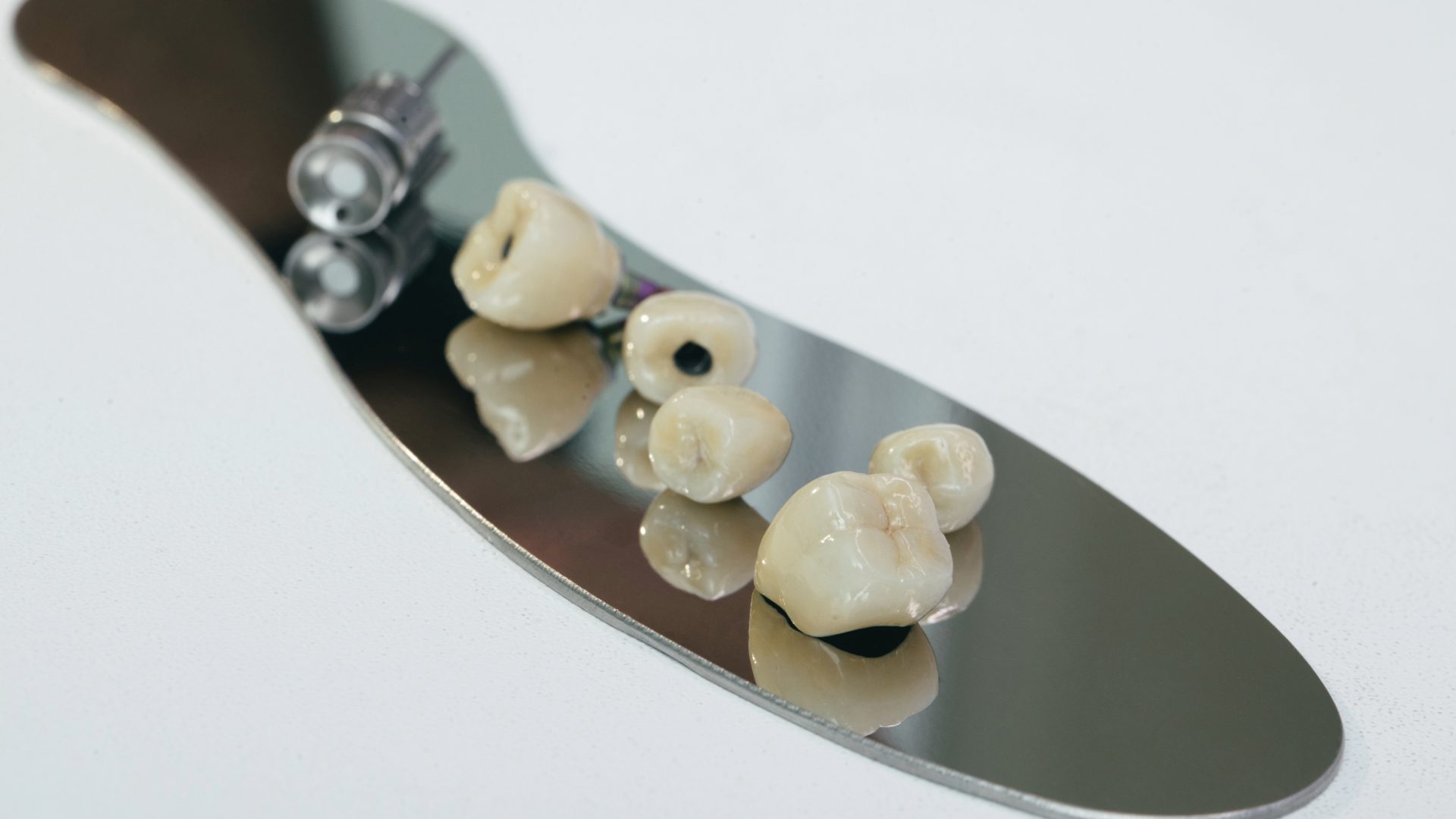You’re enjoying dinner when you hear that unmistakable “crack” sound in your mouth – your heart skips a beat as you wonder if something’s gone wrong with your dental crown. If you’ve invested in crowns, that moment of panic is completely understandable.
But here’s the reassuring truth: dental crowns don’t break easily when they’re properly made and cared for. With proper care, crowns typically last 10-15 years, and many can serve you well for decades. We’re here to help you understand what makes crowns durable, what can cause problems, and how you can protect your investment.
Understanding Dental Crown Strength
Think of a dental crown as a protective helmet for your tooth. It’s a custom-made cap that fits over your damaged or weakened tooth to restore its shape, size, and strength. But just like any restoration, its durability depends on several key factors:
What Makes Crowns Durable
- The material it’s made from – porcelain, ceramic, metal, or combinations each have different strengths
- How precisely it fits – a well-fitted crown distributes biting forces evenly
- Your daily habits – what you eat and how you use your teeth matters
- The health of the underlying tooth – a strong foundation supports the crown better
Modern crowns can last upwards of 30 years with proper care and maintenance, though the average lifespan is 10-15 years. That’s pretty impressive durability for something that works as hard as your teeth do every day!
What Can Cause Dental Crowns to Break?
While crowns are built to last, certain situations can put them at risk. Understanding these can help you avoid problems down the road.
Hard Foods and Objects
We get it – sometimes you forget and bite down on an ice cube or that unpopped popcorn kernel catches you off guard. Hard objects like ice, nuts, and hard candies can create enough pressure to crack or chip a crown, especially if it’s made from all-porcelain material.
The good news? This is completely preventable. Being mindful of what you bite into can save you from an unexpected dental emergency.
Teeth Grinding and Clenching
Do you wake up with jaw soreness or headaches? You might be grinding or clenching your teeth at night without realizing it. This habit puts tremendous pressure on crowns and can cause them to break over time.
If you’re a grinder, don’t worry – we can help protect your crowns and natural teeth with a custom nightguard. It’s a small investment that can save you significant discomfort and expense later.
Poor Oral Hygiene
Here’s something many people don’t realize: while the crown itself can’t get cavities, the tooth underneath is still susceptible to decay. If bacteria sneak under the crown’s edges, they can weaken the foundation that supports it.
This is why we always emphasize that good oral hygiene is just as important with crowns as it is with your natural teeth.
Normal Wear and Tear
Over time, the constant pressure of chewing and the dental cement that holds the crown in place can weaken. This is completely normal – it’s just part of how dental restorations age.
Regular dental checkups help us catch these changes early, often before they become problems you’ll notice.

Types of Crowns and Their Durability
Not all crowns are created equal when it comes to strength. Let’s break down your options:
Metal Crowns
Metal crowns, including gold and palladium, are known for their exceptional durability and can last 15-20 years. They rarely break or chip and can handle significant biting forces.
The trade-off? They’re not the most aesthetically pleasing option, which is why they’re typically used for back teeth where strength matters more than appearance.
Porcelain-Fused-to-Metal (PFM) Crowns
PFM crowns combine the strength of metal with porcelain’s natural appearance and typically last 10-15 years. They offer a good balance of durability and aesthetics.
Occasionally, the porcelain layer might chip, but the metal underneath usually stays intact, continuing to protect your tooth.
All-Porcelain or All-Ceramic Crowns
These provide the most natural-looking results and are perfect for front teeth. Porcelain and ceramic crowns last 10-15 years, though they require more careful handling than metal options.
Modern ceramic materials have come a long way in terms of strength, but they’re still more susceptible to fractures under extreme pressure.
What to Do If Your Crown Breaks
First, take a deep breath! A broken crown isn’t usually a dental emergency unless you’re experiencing severe pain. Here’s what to do:
Emergency Steps for a Broken Crown
- Assess the situation – Is it chipped, cracked, or completely off?
- Save the crown if possible – Clean it gently and store it safely
- Call us right away – We’ll get you in as soon as possible
- Protect the exposed tooth – Dental wax from the pharmacy can provide temporary relief
- Avoid that side – Don’t chew on the affected area until we can see you
Remember, delaying treatment can lead to more serious problems. The sooner we can address it, the better your options will be.

How to Protect Your Dental Crowns
The best way to avoid crown problems is prevention. Here are our top tips for keeping your crowns healthy:
Be Smart About What You Eat
Avoid chewing ice, hard candies, nuts, and sticky foods that can damage or dislodge your crown. If you love crunchy snacks, try cutting them into smaller pieces or choosing softer alternatives.
And please, never use your teeth as tools to open packages or bottles – that’s a common way we see crowns get damaged.
Keep Up with Excellent Oral Hygiene
Brush twice daily with fluoride toothpaste and floss around your crown every day. Pay special attention to where the crown meets your gumline – that’s where plaque loves to hide.
Don’t worry about flossing pulling your crown off – that won’t happen with a properly fitted crown that’s had time to set.
Address Teeth Grinding
If you grind your teeth, especially at night, talk to us about a custom nightguard. This protective appliance can prevent significant damage to your crowns and natural teeth.
Signs of grinding include morning jaw soreness, headaches, and worn-looking teeth.
Stay on Top of Regular Checkups
Patients who maintain regular dental visits experience up to 60% longer crown longevity compared to those who only seek emergency care. We can spot potential issues early and keep your crowns in great shape.

When to Contact Your Dentist
⚠️ Call Us If You Notice:
While crowns are durable, they’re not meant to last forever. Here are signs you should give us a call:
- Your crown feels loose or moves when you touch it
- You experience pain or sensitivity around the crowned tooth
- You notice visible cracks, chips, or changes in the crown
- There’s discomfort when you bite down
- The crown has fallen out completely
Don’t try to fix crown issues yourself – we have the proper tools and expertise to address problems safely and effectively.
The Investment Perspective
Let’s talk about value for a moment. A replacement crown can cost several hundred to over a thousand dollars, depending on the material and your insurance coverage. Compare that to the cost of preventive care:
Prevention vs. Replacement Costs
- Regular cleanings and checkups
- A custom nightguard if you grind your teeth
- Being mindful of your eating habits
Prevention is always more affordable than replacement, not to mention more comfortable!

Your Crown Care Partner in Eastpointe, MI
So, do crowns break easily? The answer is no – not when they’re properly made, fitted, and cared for. With the right approach, your crowns can serve you well for many years, protecting your teeth and keeping your smile confident.
At Patient Empowered Dentistry, we’re committed to helping you get the most out of your dental investments. Whether you need a new crown or want to ensure your existing ones stay healthy, Dr. Dyki and our team are here to support you every step of the way.
Have questions about your crowns or want to schedule a checkup? Book your appointment online or contact us today. Your smile is worth protecting!
